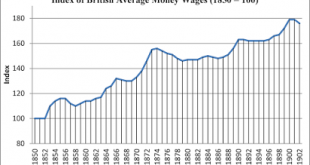Chapter 14 of volume 1 of Capital is called “The Division of Labour and Manufacture” and examines the nature of division of labour in early manufacture from the mid-16th to the late 18th centuries.Marx divides the chapter into five sections: (1) The Dual Origin of Manufacture.(2) The Specialised Worker and his Tools(3) The Two Fundamental Forms of Manufacture(4) The Division of Labour in Manufacture, and the Division of Labour in Society(5) The Capitalist Character of Manufacture. It is...
Read More »Marx’s Capital, Volume 1, Chapter 13: A Critical Summary
Chapter 13 of volume 1 of Capital is called “Co-operation” and it deals with the concept of cooperation of workers in production process and with historical aspects of the development of capitalist modes of production.Marx sees cooperation in capitalism as having three historical forms (1) simple co-operation, (2) manufacture, and (3) modern industry, but the earlier forms can persist within modern capitalism (Brewer 1984: 50).At the beginning of capitalist history, Marx sees changes in the...
Read More »Marx’s Capital, Volume 1, Chapter 12: A Critical Summary
Chapter 12 of volume 1 of Capital is called “The Concept of Relative Surplus Value” and it deals with yet further aspects of surplus value.Marx points to another way of increasing surplus value. He considers this representation of the working day: Working Day 1: A-----------B--CWorking Day 2: A-----B′---B--C AB represents the necessary labour-time equivalent to the value of maintaining and reproducing workers. BC therefore represents surplus labour.In Working Day 2, the total length of the...
Read More »Louis Boudin on the Contradiction between Volumes 1 and 3 of Marx’s Capital
From Louis Boudin’s book The Theoretical System of Karl Marx in the Light of Recent Criticism (1920): “The appearance in 1894 of the third volume of Capital created a sensation in interested circles. While it does not stand in any direct relation to the Revisionist movement, it can hardly be denied that it made its formal argumentation more plausible. The solution of the Great Contradiction contained in the third volume, and the rest of the matter therein contained and intimately connected...
Read More »Marx’s Capital, Volume 1, Chapter 11: A Critical Summary
Chapter 11 of volume 1 of Capital is called “The Rate and Mass of Surplus-Value” (Marx 1990: 417), and it deals with further aspects of surplus value.In essence, Marx makes a number of points in this chapter as follows: (1) the rate of surplus value is dependent on the duration of the working day and the value of labour-power;(2) the total mass of surplus value can be measured by s/v multiplied by the value of total variable capital, and capitalists wish to maximise the mass of...
Read More »Marx’s Capital, Volume 1, Chapter 10: A Critical Summary
Chapter 10 of volume 1 of Capital is called “The Working Day” (Marx 1990: 340), and it deals with aspects of the working day in capitalism.Marx divides the chapter into seven sections: (1) The Limits of the Working Day;(2) The Voracious Appetite for Surplus Labour;(3) Branches of English Industry without Legal Limits to Exploitation(4) Day-Work and Night-Work. The Shift System(5) The Struggle for a Normal Working Day(6) The Struggle for a Normal Working Day. Laws for the Compulsory...
Read More »Robert Wilbrandt’s Interpretation of Marx’s Law of Value in Volume 1 of Capital
The socialist German economist Robert Wilbrandt (1875–1954), the author of Karl Marx: versuch einer Würdigung (Leipzig, 1920), had an interesting interpretation of the “law of value” in volume 1 of Capital, as described by Alexander Gray: “Professor Wilbrandt, in his very sensitive appreciation of Karl Marx, offers us two points which are of some interest towards an appreciation of what Marx's admirers think that Marx really meant. The first is a rather naive admission that the first Volume...
Read More »Marx’s Capital, Volume 1, Chapter 9: A Critical Summary
Chapter 9 of volume 1 of Capital is called “The Rate of Surplus Value” (Marx 1990: 320), and it discusses aspects of surplus value.Marx divides the chapter into four sections: (1) The Degree of Exploitation of Labour-Power;(2) The Representation of the Value of the Product by Corresponding Proportional Parts of the Product;(3) Senior’s “Last Hour”(4) The Surplus Product. A section by section summary follows.(1) The Degree of Exploitation of Labour-Power Surplus value is generated in...
Read More »David Harvey on Reading Marx’s Capital, Volume 1, Class 05
David Harvey is a Professor of Anthropology and Geography at the Graduate Center of the City University of New York.Class 5 of his video series on Reading Marx’s Capital, Volume 1 is below. This video deals with Chapters 7, 8 and 9 of volume 1 of Capital.[embedded content]Although I have not yet done Chapter 9, my own critical analysis of chapters 7 and 8 in Capital is here: “Marx’s Capital, Volume 1, Chapter 7: A Critical Summary,” July 31, 2015.“Marx’s Capital, Volume 1, Chapter 8: A...
Read More »Two Instances where Marx’s Theory of Value in Volume 3 Intrudes into Volume 1 of Capital
In fact, it happens in two obscure footnotes in Chapters 5 and 8 in volume 1 of Capital.The first comes in a footnote at the end of Chapter 5 in which Marx discusses the nature of capital. I give the relevant part of the main text with the footnote below: “The conversion of money into capital has to be explained on the basis of the laws that regulate the exchange of commodities, in such a way that the starting point is the exchange of equivalents.1”[Footnote] (1) “From the foregoing...
Read More » Heterodox
Heterodox

